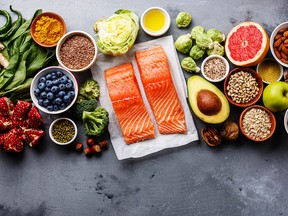People and households on low incomes, especially those on income or disability assistance, can’t afford a healthy diet after paying rent

Article content
A BC family of four needed over $1,250 a month to feed themselves a nutritious diet last year, an amount too rich for many trying to get by on low and modest incomes.
Advertisements 2
Article content
The BC Center for Disease Control (BCCDC) released the Food Costing in BC 2022 report on Thursday, calling out food insecurity as a “significant public health issue” in the province.
Article content
The data showed a nutritious diet for a family of four in May and June last year was $1,263 per month — an amount that families and individuals living on low incomes are unlikely to be able to afford.
“The price of food does not affect everyone equally and the root cause of household food insecurity is low income,” said Dr. Geoff McKee, director of population and public health at the BCCDC.
The BCCDC’s food costing report is usually done every two years, but because of COVID-19 this is the first one since 2017. And if it shows high costs for food in 2022, it can only get worse now with spiraling inflation.
Article content
Advertisements 3
Article content
The report uses a survey tool known as the national nutritious food basket to determine the cost of 61 food items in grocery stores in different parts of the province. The report showed monthly costs last year in the five regional health authorities ranged from a low of $1,193 in Fraser Health to a high of $1,366 in Island Health.
-

Why the food insecure need swift government action
-

BC announced $200 million to improve food security
The report reviews five household compositions and income levels. It showed people and households on low incomes, especially those on income or disability assistance, can’t afford a healthy diet after paying rent.
Some four per cent of British Columbians were found to be experiencing severe food insecurity, which is defined as missing meals, reducing intake or not eating for a day or more at a time. Another 15 per cent, about 732,000 people, struggle to put food on the table.
Advertisements 4
Article content
“Access to affordable, culturally preferable, nutritious and safe food is critical to the health and well-being of British Columbians,” said Dr. Charmaine Enns, medical health officer for Island Health. “Household food insecurity takes a major toll on people’s physical and mental health, social and emotional well-being, and on our provincial health-care system.”
Studies have shown health-care costs for those experiencing food insecurity are 76 per cent higher among adults. They’re at higher risk of chronic disease such as diabetes, heart disease and high blood pressure, and can deal with increased levels of anxiety, sleep disturbance, social isolation and depression.
Babies, kids and youth are at an increased risk of anemia, asthma and hospitalization on unhealthy or inadequate diets, and they also have poorer academic outcomes and social skills.
Advertisements 5
Article content
The report’s authors concluded that more than food banks and community gardens are needed to address the problem of food insecurity.
“The price of food has the biggest impact on those with the lowest incomes,” read the report. “Research shows that the strongest predictor of household food insecurity is not food prices, but inadequate incomes.”
Boosting income for the poorest is key, according to the report.
“In the context of record inflation, increasing costs of living, climate-change impacts on the food system and ongoing recovery from the COVID-19 pandemic, there is an urgent need for equity-based solutions to food insecurity in BC,” said the authors.
The BCCDC report on food costs is a collaboration with the Provincial Health Services Authority.
Spring subscription sales: Our in-depth journalism is possible thanks to the support of our subscribers. For a limited time, you can get full online access to the Vancouver Sun and The Province, along with the National Post and 13 other Canadian news sites, for just $40 for one year or $1 a week for 52 weeks. Support our journalism by subscribing today: The Vancouver Sun.
For more health news and content around diseases, conditions, wellness, healthy living, drugs, treatments and more, head to Healthing.ca – a member of the Postmedia Network.


Comments
Postmedia is committed to maintaining a lively but civil forum for discussion and encourages all readers to share their views on our articles. Comments may take up to an hour for moderation before appearing on the site. We ask you to keep your comments relevant and respectful. We have enabled email notifications—you will now receive an email if you receive a reply to your comment, there is an update to a comment thread you follow or if a user you follow comments. Visit our Community Guidelines for more information and details on how to adjust your email settings.
Join the Conversation